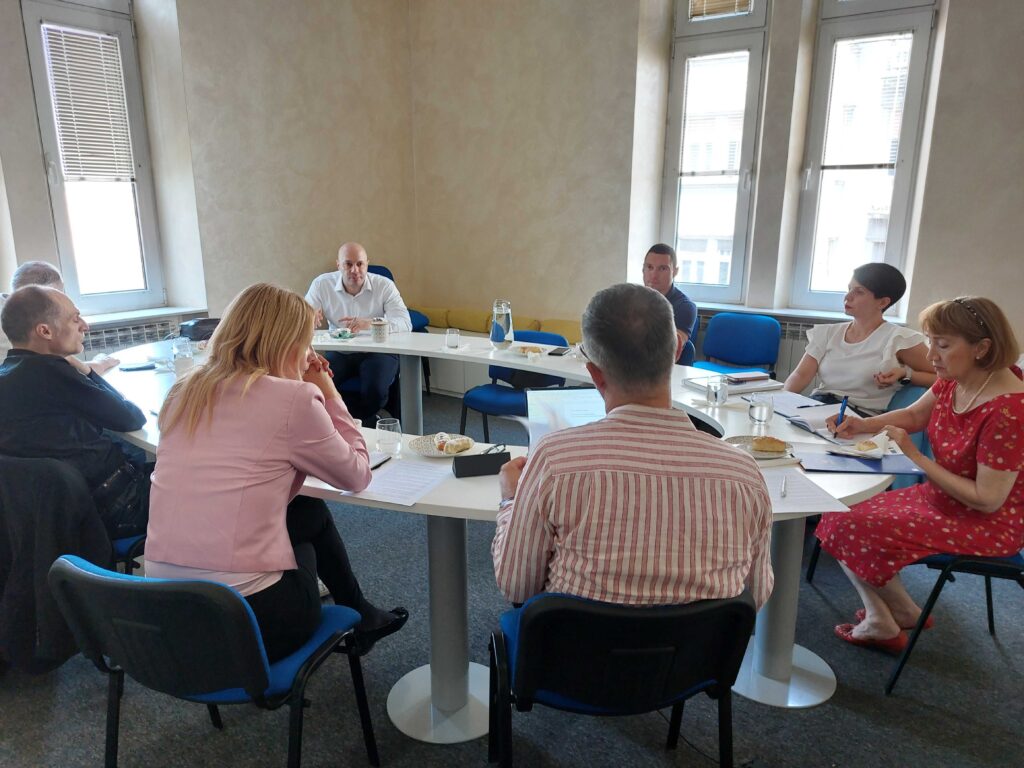Headquarters: Svetog Nauma 7, 11000
Office address: Đorđa Vajferta 13, 11000
Phone:: +381 11 4529 323

21 June 2023 – The joint session of the working groups of the National Convention on the EU for Chapters 28 (Consumer and health protection) and 3 (Right of establishment and freedom to provide services) coordinated by CEP was held in the premises of the NCEU. At the beginning of the session, the coordinator of the National Convention on the EU, Bojana Selaković, welcomed members of working groups, and the coordinators of the working groups, Nebojša Lazarević for Chapter 28, and Dušan Protić for Chapter 3, presided.
The focus of the meeting was on Chapter 28, primarily on the recent proposal for amendments to the EU directive prohibiting built-in defects in devices, provisions that may be the basis for amending the Law on Consumer Protection, and administrative measures in monitoring unfair business practices. The discussion continued on the sustainability of the system of assistance to consumer organisations, mechanisms for financing their work and the possibility of forming a fund at the national level. At the same time, it was noted that a comprehensive analysis of the work alternative dispute resolution (ADR) body, which is financed from the budget, should be conducted.
One of the suggestions for improving the work of consumer protection is the establishment of the institution of Consumer Ombudsman. This foreign body would be authorised to resolve consumer complaints in a quick informal procedure.

Members were informed that last year CEP sent the initiative to amend the Law on Civil Procedure related to collective consumer lawsuits to the Ministry of Justice. Still, there has been no feedback until this moment. The National Convention will request a meeting with the Ministry of Justice on this issue.
In the health field, the new Digitalisation Programme of the health system and the need for complete and comprehensive integration of information systems in health, which are currently diverse and mutually unrelated, were discussed. It was established that connecting all primary, secondary and tertiary healthcare institutions is necessary. In light of the recent tragic events, it was proposed to improve the work on the Strategy for the Protection of the population’s mental health. Based on the experience gained in the fight against the COVID-19 pandemic, it will be recommended that competent authorities precisely define how they will carry out preparations and analyses in response to future pandemics. The issue of regulations regulating organ transplantation and applying the Law on the Protection of Critical Infrastructure in public health was also raised.
Present members noted that there had been no progress in Chapter 3 since the Government’s adoption of the Negotiating Position and approval by the European Commission. The process of approval by individual member states has slowed down. Despite the efforts of the Serbian side, there are no results for now.
Institutions responsible for this area continue further harmonisation of sectoral regulations with relevant directives, and the biggest challenge in this chapter is the adoption of the Law on Services and the establishment of the Single point of contact. It was agreed that members of Working Groups 3 and 28 .would continue regular communication with competent institutions and the EU Delegation to contribute to progress in these areas through joint efforts.